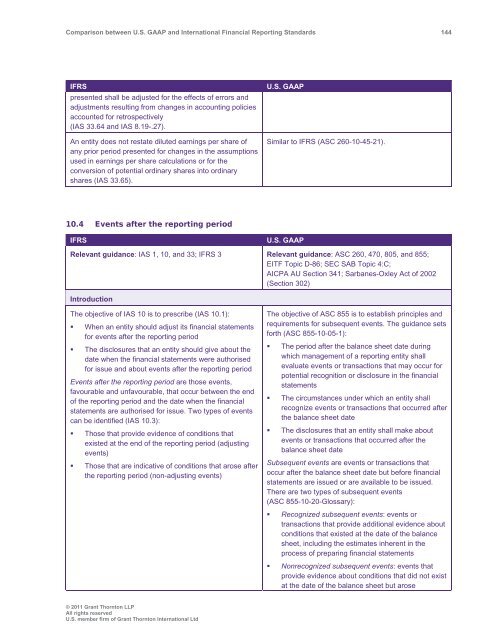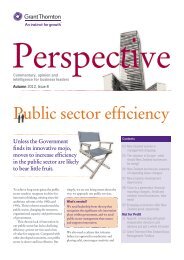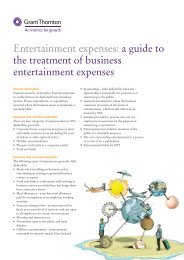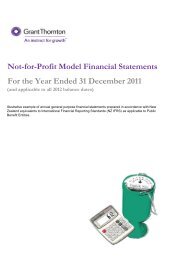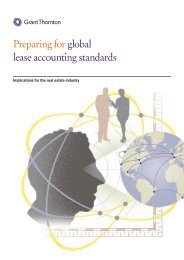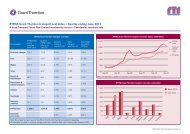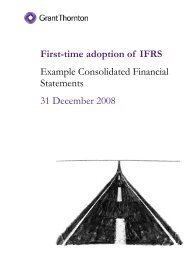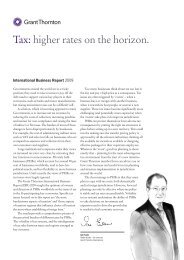Comparison between U.S. GAAP and International ... - Grant Thornton
Comparison between U.S. GAAP and International ... - Grant Thornton
Comparison between U.S. GAAP and International ... - Grant Thornton
You also want an ePaper? Increase the reach of your titles
YUMPU automatically turns print PDFs into web optimized ePapers that Google loves.
<strong>Comparison</strong> <strong>between</strong> U.S. <strong>GAAP</strong> <strong>and</strong> <strong>International</strong> Financial Reporting St<strong>and</strong>ards 144<br />
IFRS<br />
presented shall be adjusted for the effects of errors <strong>and</strong><br />
adjustments resulting from changes in accounting policies<br />
accounted for retrospectively<br />
(IAS 33.64 <strong>and</strong> IAS 8.19-.27).<br />
An entity does not restate diluted earnings per share of<br />
any prior period presented for changes in the assumptions<br />
used in earnings per share calculations or for the<br />
conversion of potential ordinary shares into ordinary<br />
shares (IAS 33.65).<br />
U.S. <strong>GAAP</strong><br />
Similar to IFRS (ASC 260-10-45-21).<br />
10.4 Events after the reporting period<br />
IFRS<br />
U.S. <strong>GAAP</strong><br />
Relevant guidance: IAS 1, 10, <strong>and</strong> 33; IFRS 3 Relevant guidance: ASC 260, 470, 805, <strong>and</strong> 855;<br />
EITF Topic D-86; SEC SAB Topic 4:C;<br />
AICPA AU Section 341; Sarbanes-Oxley Act of 2002<br />
(Section 302)<br />
Introduction<br />
The objective of IAS 10 is to prescribe (IAS 10.1):<br />
• When an entity should adjust its financial statements<br />
for events after the reporting period<br />
• The disclosures that an entity should give about the<br />
date when the financial statements were authorised<br />
for issue <strong>and</strong> about events after the reporting period<br />
Events after the reporting period are those events,<br />
favourable <strong>and</strong> unfavourable, that occur <strong>between</strong> the end<br />
of the reporting period <strong>and</strong> the date when the financial<br />
statements are authorised for issue. Two types of events<br />
can be identified (IAS 10.3):<br />
• Those that provide evidence of conditions that<br />
existed at the end of the reporting period (adjusting<br />
events)<br />
• Those that are indicative of conditions that arose after<br />
the reporting period (non-adjusting events)<br />
The objective of ASC 855 is to establish principles <strong>and</strong><br />
requirements for subsequent events. The guidance sets<br />
forth (ASC 855-10-05-1):<br />
• The period after the balance sheet date during<br />
which management of a reporting entity shall<br />
evaluate events or transactions that may occur for<br />
potential recognition or disclosure in the financial<br />
statements<br />
• The circumstances under which an entity shall<br />
recognize events or transactions that occurred after<br />
the balance sheet date<br />
• The disclosures that an entity shall make about<br />
events or transactions that occurred after the<br />
balance sheet date<br />
Subsequent events are events or transactions that<br />
occur after the balance sheet date but before financial<br />
statements are issued or are available to be issued.<br />
There are two types of subsequent events<br />
(ASC 855-10-20-Glossary):<br />
• Recognized subsequent events: events or<br />
transactions that provide additional evidence about<br />
conditions that existed at the date of the balance<br />
sheet, including the estimates inherent in the<br />
process of preparing financial statements<br />
• Nonrecognized subsequent events: events that<br />
provide evidence about conditions that did not exist<br />
at the date of the balance sheet but arose<br />
© 2011 <strong>Grant</strong> <strong>Thornton</strong> LLP<br />
All rights reserved<br />
U.S. member firm of <strong>Grant</strong> <strong>Thornton</strong> <strong>International</strong> Ltd


